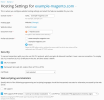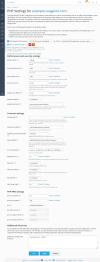- Server operating system version
- Debian 11
- Plesk version and microupdate number
- Plesk Obsidian Version 18.0.50
This guide is about how to install and run Magento 2.4x on Plesk without Docker.
Our example domain will be "example-magento.com" make sure you replace this detail to the domain where you would like to set-up the magneto site.
We won't cover the installation of the required components, by request I can add some details.
Pre-requirements:
Plesk Obsidian - Version 18.0.50
Mariadb 10.5.18
Php 7.4 (for now)
Nginx
Composer 2
Memcached
Opcache
Redis 6
Elasticsearch 7.9.x
In our experience running Magento systems with Plesk it is recommended to create a custom vhost template.
Create the directory /opt/psa/admin/conf/templates/custom/domain copy the nginxDomainVirtualHost.php from /opt/psa/admin/conf/templates/default/domain to this directory.
Open the the copied file in your prefered editor /opt/psa/admin/conf/templates/custom/domain/nginxDomainVirtualHost.php
@line 217 replace
with
- Enable "Permanent SEO-safe 301 redirect from HTTP to HTTPS" !
- Php version 7.4x
- FPM application served by Nginx (Use dedicated if you understand how it works)

Additional headers for development:
Additional headers for production:
Additional Apache directives both HTTP and HTTPS
Optionally you can add the following directives:
nginx settings
Proxy mode enabled
Smart static files processing enabled
Serve static files directly by nginx enabled
Maximum allowed HTTP request body size
128MB
Enable nginx caching
Cache size
64MB
Cache timeout
5 seconds
Additional nginx directives
memory_limit
2048M
max_execution_time
180
max_execution_time
180
post_max_size
64M
upload_max_filesize
64M
The following settings are required and recommended:
opcache.enable
On
include_path
.
short_open_tag
On
PHP-FPM settings:
pm.max_children
20
pm.max_requests
500
Additional directives:
max_input_vars = 18000

Login via ssh and create the .bashrc file at the /var/www/vhosts/example-magento.com location (domain service root), make sure this file has the proper web-space owner permissions!
With this solution you can create a php.ini specific for the site's php CLI to enable some services or raise timeouts, memory limits etc.
I hope it's understandable and I haven't missed anything, enjoy and I will gladly help if something is not clear.
Our example domain will be "example-magento.com" make sure you replace this detail to the domain where you would like to set-up the magneto site.
We won't cover the installation of the required components, by request I can add some details.
Pre-requirements:
Plesk Obsidian - Version 18.0.50
Mariadb 10.5.18
Php 7.4 (for now)
Nginx
Composer 2
Memcached
Opcache
Redis 6
Elasticsearch 7.9.x
In our experience running Magento systems with Plesk it is recommended to create a custom vhost template.
Create the directory /opt/psa/admin/conf/templates/custom/domain copy the nginxDomainVirtualHost.php from /opt/psa/admin/conf/templates/default/domain to this directory.
Open the the copied file in your prefered editor /opt/psa/admin/conf/templates/custom/domain/nginxDomainVirtualHost.php
@line 217 replace
PHP:
<?php if ($VAR->domain->physicalHosting->directoryIndex && !$VAR->domain->physicalHosting->proxySettings['nginxProxyMode']): ?>
index <?=$VAR->quote($VAR->domain->physicalHosting->directoryIndex)?>;
<?php endif ?>
PHP:
<?php if ($VAR->domain->physicalHosting->directoryIndex): ?>
location ~ /$ {
index index.php index.cgi index.pl index.html index.xhtml index.htm index.shtml;
try_files $uri $uri/ /index.php$is_args$args;
}
# index <?=$VAR->quote($VAR->domain->physicalHosting->directoryIndex)?>;
<?php endif ?>Web Hosting Access
Create the domain and allow "Access to the server over SSH" and the usage of bin/bashHosting Settings
- Document root "httpdocs/pub"- Enable "Permanent SEO-safe 301 redirect from HTTP to HTTPS" !
- Php version 7.4x
- FPM application served by Nginx (Use dedicated if you understand how it works)

Apache & nginx Settings
Index files (we have a custom maintenance page what runs from the index.html)
Code:
index.php index.htmlAdditional headers for development:
Code:
Cache-Control: public
Strict-Transport-Security: max-age=-1
X-Frame-Options: SAMEORIGINAdditional headers for production:
Code:
Cache-Control: public
Strict-Transport-Security: max-age=63072000
X-Frame-Options: SAMEORIGINAdditional Apache directives both HTTP and HTTPS
Code:
<IfModule mod_security2.c>
SecResponseBodyLimit 546870912
</IfModule>
Code:
<Directory /var/www/vhosts/example-magento.com>
Options +ExecCGI +FollowSymlinks
</Directory>nginx settings
Proxy mode enabled
Smart static files processing enabled
Serve static files directly by nginx enabled
Maximum allowed HTTP request body size
128MB
Enable nginx caching
Cache size
64MB
Cache timeout
5 seconds
Additional nginx directives
Code:
set $MAGE_ROOT "/var/www/vhosts/example-magento.com/httpdocs/pub";
location ~ ^/setup {
root $MAGE_ROOT;
location ~ ^/setup/index.php(/.*)?$ {
fastcgi_index index.php;
fastcgi_param SCRIPT_FILENAME $document_root$fastcgi_script_name;
}
location ~ ^/setup/(?!pub/). {
deny all;
}
location ~ ^/setup/pub/ {
add_header X-Frame-Options "SAMEORIGIN";
}
}
# PHP entry point for update application
location ~ ^/update {
root $MAGE_ROOT;
location ~ ^/update/index.php(/.*)?$ {
fastcgi_index index.php;
fastcgi_param SCRIPT_FILENAME $document_root$fastcgi_script_name;
fastcgi_param PATH_INFO $fastcgi_path_info;
}
# Deny everything but index.php
location ~ ^/update/(?!pub/). {
deny all;
}
location ~ ^/update/pub/ {
add_header X-Frame-Options "SAMEORIGIN";
}
if (!-e $request_filename){ rewrite ^(/.*)(/.+)$ /index.php$is_args$args last; }
}
location @fallback {
return 404;
}
#location / { try_files $uri $uri/ /index.php$is_args$args; }
location /pub/ {
location ~ ^/pub/media/(downloadable|customer|import|custom_options|theme_customization/.*\.xml) {
deny all;
}
alias $MAGE_ROOT/pub/;
add_header X-Frame-Options "SAMEORIGIN";
}
location /static/ {
# Uncomment the following line in production mode
# expires max;
# Remove signature of the static files that is used to overcome the browser cache
location ~ ^/static/version {
rewrite ^/static/(version\d*/)?(.*)$ /static/$2 last;
}
location ~* \.(ico|jpg|jpeg|png|gif|svg|js|css|swf|eot|ttf|otf|woff|woff2|html|json)$ {
add_header Cache-Control "public";
add_header X-Frame-Options "SAMEORIGIN";
expires +1y;
if (!-f $request_filename) {
rewrite ^/static/(version\d*/)?(.*)$ /static.php?resource=$2 last;
}
}
location ~* \.(zip|gz|gzip|bz2|csv|xml)$ {
add_header Cache-Control "no-store";
add_header X-Frame-Options "SAMEORIGIN";
expires off;
if (!-f $request_filename) {
rewrite ^/static/(version\d*/)?(.*)$ /static.php?resource=$2 last;
}
}
if (!-f $request_filename) {
rewrite ^/static/(version\d*/)?(.*)$ /static.php?resource=$2 last;
}
add_header X-Frame-Options "SAMEORIGIN";
}
location /media/ {
try_files $uri $uri/ /get.php$is_args$args;
location ~ ^/media/theme_customization/.*\.xml { deny all; }
location ~ ^/(.*\.(ico|jpg|jpeg|png|gif|svg|js|css|swf|eot|ttf|otf|woff|woff2|json))$ {
add_header Cache-Control "public";
add_header X-Frame-Options "SAMEORIGIN";
expires +1y;
log_not_found off;
access_log off;
add_header ETag "";
add_header Access-Control-Allow-Origin "www.example-magento.com, example-magento.com";
try_files $uri $uri/ /get.php$is_args$args;
}
location ~ ^/(.*\.(zip|gz|gzip|bz2|csv|xml))$ {
add_header Cache-Control "no-store";
add_header X-Frame-Options "SAMEORIGIN";
expires off;
log_not_found off;
access_log off;
add_header ETag "";
add_header Access-Control-Allow-Origin "www.example-magento.com,example-magento.com";
try_files $uri $uri/ /get.php$is_args$args;
}
add_header X-Frame-Options "SAMEORIGIN";
}
location /media/customer/ { deny all; }
location /media/downloadable/ { deny all; }
location /media/import/ { deny all; }
location ~ ^/(index|get|static|errors/report|errors/404|errors/503|health_check)\.php$ {
try_files $uri =404;
add_header X-Processing-Time $request_time always;
add_header X-Request-ID $request_id always;
add_header X-UA-Compatible 'IE=Edge,chrome=1';
add_header Link "<$scheme://$http_host$request_uri>; rel=\"canonical\"" always;
}
location ~ /$ {
if (!-e $request_filename){ rewrite ^(/.*)([^/]+/)$ /index.php$is_args$args last; }
}
gzip on;
gzip_disable "MSIE [1-6]\\.(?!.*SV1)";
gzip_proxied any;
gzip_comp_level 5;
gzip_types text/plain text/css application/javascript application/x-javascript text/xml application/xml application/xml+rss text/javascript image/x-icon image/bmp image/svg+xml;
gzip_vary on;
fastcgi_buffers 16 16k;
fastcgi_buffer_size 32k;
fastcgi_read_timeout 600s;
fastcgi_connect_timeout 600s;
proxy_buffer_size 128k;
proxy_buffers 4 256k;
proxy_busy_buffers_size 256k;PHP Settings
(adjust these settings to your own needs)memory_limit
2048M
max_execution_time
180
max_execution_time
180
post_max_size
64M
upload_max_filesize
64M
The following settings are required and recommended:
opcache.enable
On
include_path
.
short_open_tag
On
PHP-FPM settings:
pm.max_children
20
pm.max_requests
500
Additional directives:
max_input_vars = 18000

Login via ssh and create the .bashrc file at the /var/www/vhosts/example-magento.com location (domain service root), make sure this file has the proper web-space owner permissions!
Code:
alias php="/opt/plesk/php/7.4/bin/php -c /var/www/vhosts/system/example-magento.com/etc/php.ini -d memory_limit=4G -d max_execution_time=360000"
alias composer="/opt/plesk/php/7.4/bin/php -c /var/www/vhosts/system/example-magento.com/etc/php.ini -d memory_limit=4G -d max_execution_time=360000 /usr/lib64/plesk-9.0/composer.phar"
export PATH="$PATH:/opt/plesk/php/7.4/bin:/var/www/vhosts/example-magento.com/.rbenv/shims:/usr/local/bin:/usr/bin:/usr/local/sbin:/usr/sbin:/var/www/vhosts/example-magento.com/httpdocs";With this solution you can create a php.ini specific for the site's php CLI to enable some services or raise timeouts, memory limits etc.
I hope it's understandable and I haven't missed anything, enjoy and I will gladly help if something is not clear.

